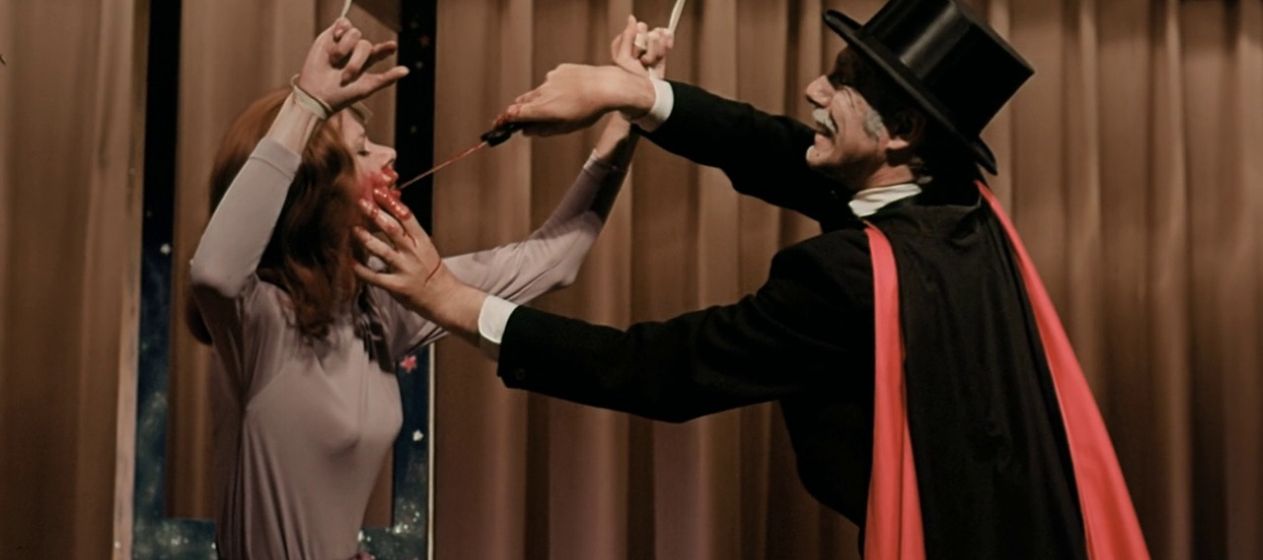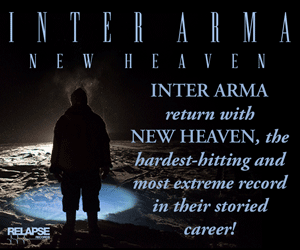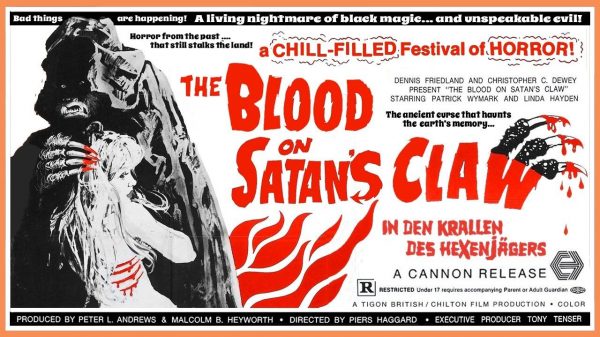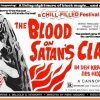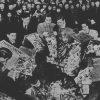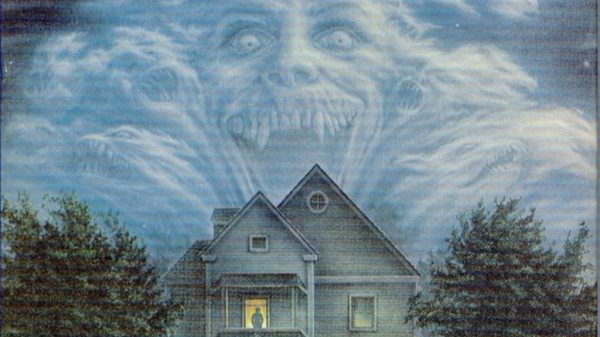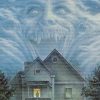What is real? Are you certain you know what reality is? How do you know that at this second you aren’t asleep in your beds dreaming that you are here in this theater? – Montag the Magnificent.
Simulation is no longer a referential being or a substance, it is the generation by models of a real without origin or reality: a hyperreality. – Jean Baudrillard.
With the recent passing of Herschell Gordon Lewis, commonly known as the Godfather of Gore, I revisited several of his most classic films. As a horror fan and hopeful horror writer and filmmaker, I have grown to admire this director. To me, Lewis stands out more than his gore counterparts. Lewis placed his characters in positions that were so innocent but ended with violence of upmost brutality. His film The Wizard of Gore (1970) is a perfect example of this. Montag the Magnificent alters the stereotype of a magician as he gives his audience the illusion of murdering his spectators. To achieve this effect, Lewis uses cuts of the stalk-like victim standing completely still as a pick is being hammered into the brain or a pounding press is being drilled into their stomach. But the next clip is the screaming, blood-soaked and gut-filled scenes of the annihilation that is truly unfolding. Miraculously following the atrocities, you see the victim walking away in one piece. That is until the trance fades and the audience member is found dead.
In the time since I first watched Wizard…, I graduated college and learned a lot of theory. Any horror fan becomes enthralled by Lewis’ tomato-soup-blood covering kitchen-made intestines as power drills cut through flesh and swords are shoved down throats. But amongst the glorious gore, this English major made an interesting connection: Lewis refers to the theory of simulated reality and hyperreality in this film. And I discovered this with this quote: “I am Montag, master of illusion! The fire of the laws of reason! What… is real? Are you certain you know what reality is?”
Now, as a horror fan, I appreciate more depth than just the usual screaming girl covered in blood and stabbed by some guy in a mask. The reason why is because horror has the capacity to hold extraordinary rhetorical value. When I heard that quote, I developed an appreciation for TheWizard of Gore and of Lewis himself that I never had previously. Especially after I looked up Lewis himself, and found out he was formerly a literature professor.
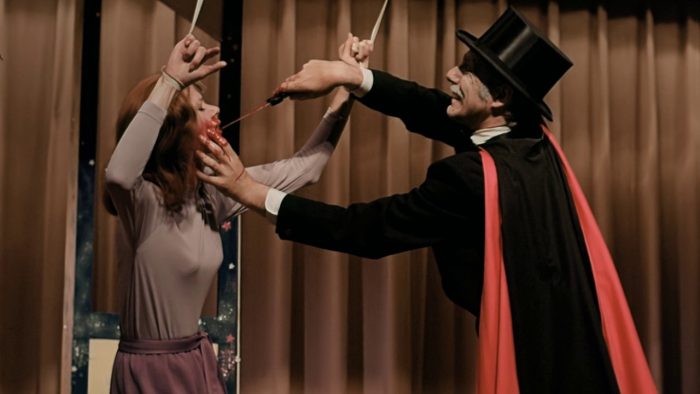
Source: Horrorpedia
In my college days, I took a Theory and Criticism course, where I was introduced to theorists who questioned our position in life and how we apply meaning to our so-called “reality.” Countless nights I spent developing headaches reading these works, and tried to make sense of these theories as I sat by my keyboard writing a paper that was due the next day. But when I walked away from this course, I learned a deeper understanding of our concept of reality and how it’s skewed by society, culture and entertainment. And with Montag’s quotes of “illusion,” “laws of reason” and “reality,” it triggered simulated reality theory louder than Montag’s own chainsaw.
To explain further, Lewis is mirroring several of these theories, but using different terms to convey the language. Montag repeats “illusion” and “hypnosis” throughout the film, both refers to “simulation” and “hyperreality” as well as relating these theories to our everyday lives, and touching on some properties of physics.
Let’s start with Montag’s use of illusion. Merriam-Webster defines “illusions” as: “something that looks or seems different from what it is.” For any Wizard fans, you know Montag uses hypnosis on specific audience members to be “willing” participants for Montag’s slaughter.
Merriam-Webster defines “hypnosis” as: “a trancelike state that resembles sleep but is induced by a person whose suggestions are readily accepted by the subject.”
And to tie all of this together, the academic definition of “simulation” is: “the active process of replacement of the real.”
To draw out this comparison a bit more, simulation is comprised of both illusion and hypnosis. Simulation is proving Montag’s views of illusions since the action of Montag’s acts looks different to the audience, including the audience members whom are his victims. To do this Montag uses hypnosis, completely altering the reality of his audience members.
Jean Baudrillard was a French philosopher who took interest in this topic. One of his most influential texts is Simulacra and Simulation. Where simulation has been defined, simulacra plays a crucial part in Montag’s devious deceit that surrounds the plot of Wizard. In the academic sense, “simulacra” is defined as “a representational image or presence that deceives; the product of simulation usurping reality.” For this film, Montag uses both his hypnosis that covers up his murder…as well as the art of magic. Because what better way to cover up bloodshed than by a distraction, or entertainment?
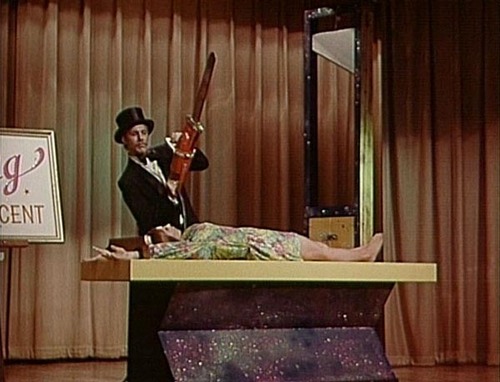
Source: Horrorpedia
Montag was also quoted saying: “But then… what is a magician? A person who tears asunder your rules of logic and crumbles your world of reality so you can go home and say: ‘Oh what clever tricks he has. What a sly deceiver’… and go to sleep in the security of your own, real world.”
Montag is doing two things: 1. proving his art is that of deceiving and 2. stating “real world” as cynicism. He’s telling the audience this so they can relate to what he’s telling them, but using double entendres so they don’t realize he’s performing his act to satisfy his bloodlust.
Now let’s look at the definition of “simulacra” again: “a representational image or presence that deceives; the product of simulation usurping reality.”
In other words, “simulacra” refers to anything that’s more specific to simulation. Especially in regard to deceiving our perception of reality. In Montag’s perception, it refers to magic and illusion.
In “Simulation and Simulacra,” Baudrillard is quoted: “…but simulacrum, that is to say never exchanged for the real, but exchanged for itself, in an uninterrupted circuit without reference or circumference.”
If you read both Montag’s and Baudrillard’s quotes, you’ll notice they’re similar. Baudrillard refers to simulacra as an exchange. Simulacra as an exchange means the embodiment of simulation is simulacra. In Montag’s quote, he is referring specifically to magic, and using examples of “rules of logic” and “clever tricks” to exacerbate the influence magic has on simulation. “Magic” is in fact simulacra because it can be exchanged with “simulation” (or our perception of reality). To extend this further, the exchange of magic and reality is uninterrupted in Montag’s case and neither has a concrete reference, so the circuit continues. This exchange is identical to the exchange Baudrillard is referring to as “simulation” and “simulacra.”
French philosopher Rene Descartes touches on a similar topic in his book Meditationes de prima philosophia: “I am like a prisoner who is enjoying an imaginary freedom while asleep; as he begins to suspect that he’s asleep, he dreads being woken up, and goes along with the pleasant illusion as long as he can.” The text before and after this passage describes Descartes as an average citizen, but he imagines a demon is controlling his senses to numb the feelings of waking up the next morning to work. Montag’s quote and his overall act of illusion compels the audience to gaze upon the “fantasy” of horror and gore, while you “go to sleep in the security of your own, real world” because Montag is only just “a sly deceiver.” Montag is using symbolic language to prove the cynicism of the idea of a “real world” in which you are just sleeping. You think you are watching Montag’s magic acts: that he’s just a magician and you go in knowing you will be deceived. But you don’t see the grotesqueries in which his acts hold, so therefore you don’t realize he’s truly murdering the people on stage. You’re too absorbed in this illusion that it blind sides you. This is because Montag put you in a trance; you think you are experiencing Montag’s act as a trick when you are truly just sleeping and living in a false reality.
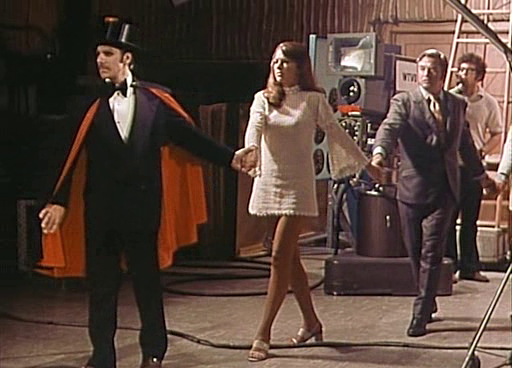
Source: Livejournal
It is because of this that we need to look at our definition of “reality.” Earlier in the passage, I quoted Montag right next to a Baudrillard quote. But I also want to look at the similarities of these quotes: the Montag quote at the beginning, and a quote from Hans Moravec.
“What is real? Are you certain you know what reality is? How do you know that at this second you aren’t asleep in your beds dreaming that you are here in this theater?” – Montag the Magnificent.
“What is reality, anyway? The idea of a simulated existence is the first link in our disturbing chain of thought. Just as a literary description of a place can exist in different languages, phrasings, printing styles, and physical media, a simulation of a world can be implemented in radically different data structures, processing steps, and hardware.” – Hans Moravec.
What Montag is doing is making us question what exactly we know about reality. Moravec is looking at reality through both a cultural and scientific lens: identifying our use of language as consciousness, and then using the significance of simulation in modern technology such as data structures and hardware.
This is exemplified by Baudrillard’s quote: “Simulation is no longer a referential being or a substance, it is the generation by models of a real without origin or reality: a hyperreality.” Here, Baudrillard is giving his concrete interpretation on the complexities of reality. He describes a “hyperreality” in regards to a reality that doesn’t have a beginning, let alone a true definition. When you strip the examples that were given by Moravec, you don’t come to any further conclusions.
And finally, to sum up all of these theories and quotes:
“If we are living in a simulation, then the cosmos that we are observing is just a tiny piece of the totality of physical existence. The physics in the universe where the computer is situated that is running the simulation may or may not resemble the physics of the world that we observe. While the world we see is in some sense ‘real’, it is not located at the fundamental level of reality.” – Nick Bostrum.
SPOILER ALERT FOR THOSE WHO HAVE NOT SEEN WIZARD OF GORE!
At the end of the film, you find out the talk show host Sherry Carson has figured out Montag’s illusion trick. After Montag asked who she is, she’s quoted with “The past… and the future. Do you think you’re the only one who deals an illusion?” Her quote, “And you… you are my illusion. You are no longer even here. You’ll have to start your little charade all over again,” has Montag lost for words (“But I… I… I am Montag!”), and then the film suddenly cuts to the very beginning.
There’s a reason why Sherry was able to transport Montag back to the beginning of the film, and this is proved by Bostrum when he states that “the simulation may or may not resemble the physics of the world that we observe.” I’m no physicist, but even I understand the significance of time and our interpretation of it. But is it really real? Bostrum is stating a lot in his quote, but anyone who lives in modern society can agree that we as humans base our everyday lives on time, in a variety of different ways. So what we observe every day (time) may not be the simulation or “illusion” that also exists in our everyday lives, and our world we observe may not line with the physics of our universe. Therefore, the beginning of the film started all over again.
I believe Lewis had a lot to convey in this film. From time itself to the possibility of a simulated reality, all of these ideas were drenched with blood and cut open to its bare intestines in The Wizard of Gore. This is why, in my opinion, Wizard is one of the most unique horror films in history. Combining the words of Baudrillard, Descartes, Bostrum and Moravec, I gained a better understanding of Lewis’ message and why he used a bloodthirsty magician as his culprit. To end this article, I hope all horror fans look at horror flicks with more depth than just wanting to watch a cool, brutal scene. Besides, is reality what we all think it is? Are we really just sitting safely in our homes, watching a brutal movie?
Works cited:
Herschell Gordon Lewis’ TheWizard of Gore
IMDB.com
Jean Baudrillard’s Simulacra and Simulation
Rene Descartes’ Meditationes de prima philosophia
Nick Bostrum’s “Are You Living in a Computer Simulation?”
Hans Moravec’s “Simulation, Consciousness, Existence”
Merriam-Webster.com

